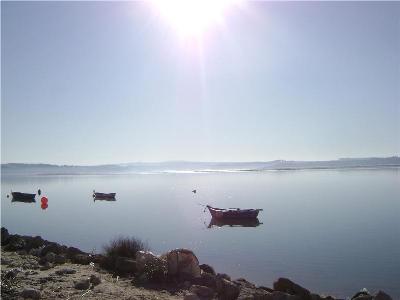About 200 billion dollars per year is the cost incurred by the shipping industry due to the marine fouling problem.
 Boats moored in a lagoon off the coast of Portugal to test the effect of variously coated steel plates (source: Tremel research group, JGU)
Boats moored in a lagoon off the coast of Portugal to test the effect of variously coated steel plates (source: Tremel research group, JGU)
Organisms such as mussels, algae, and barnacles, accumulate on the ship’s surface over time and increase the surface’s water resistance, thereby increasing fuel consumption and extra CO2 emissions. Scientists at Johannes Gutenberg University Mainz (JGU) have found a feasible solution in tiny vanadium pentoxide nanoparticles, which they claim can prevent the growth of organisms on surfaces in contact with water, such as ship hulls, offshore platforms, and sea buoys.
Several experiments have been conducted to prove their claim. Steel plates coated with dispersed vanadium pentoxide particles, which were exposed to seawater for a period of time, did not have any organism accumulation, whereas plates coated with regular paint had large amounts of fouling.
The scientists discovered this solution from nature's own defense mechanisms exhibited by brown and red algae to protect themselves against predators and microbial attacks. Some enzymes in the algae develop halogen compounds which have biocidal potential. The scientists under the guidance of Professor Dr. Wolfgang Tremel of the Institute of Inorganic Chemistry and Analytical Chemistry at JGU, decided to copy this process using vanadium pentoxide nanoparticles, which contain essential biomimetic bromination activity making them a cost-efficient and practical substitute for traditional chemical biocides.
Dr. Tremel remarks that vanadium pentoxide nanoparticles’ poor solubility and the fact that they can be mixed in the coating, makes them less toxic to marine life than tin-and copper-based active substances. He believes that this discovery will give way to a new generation of antifouling paints. Another scientist from the team, Ron Wever stated that vanadium pentoxide particles were comparatively inexpensive and more stable than genetically produced enzymes.
To further reiterate the environment safety aspect of the vanadium pentoxide nanoparticle, Dr. Klaus Peter Jochum of the Max Planck Institute for Chemistry in Mainz and his research team performed several experiments and concluded that very tiny quantities of vanadium disperse from the coating into seawater and hence will not have a negative impact on the environment.